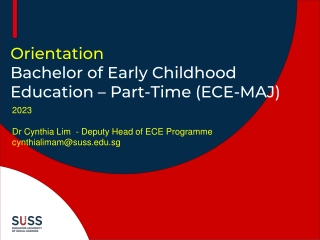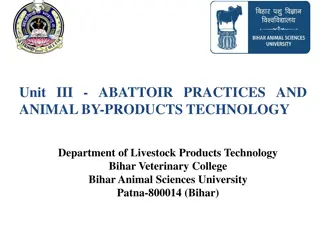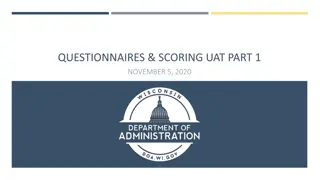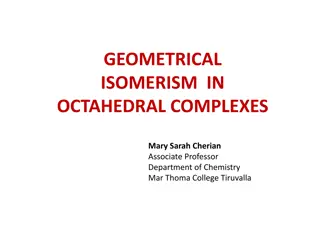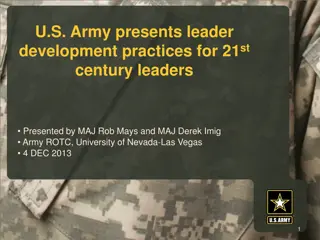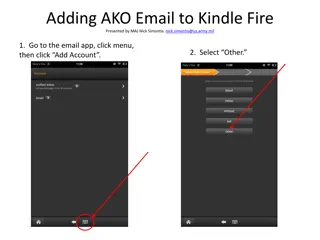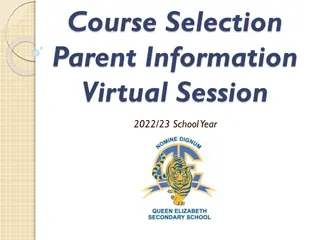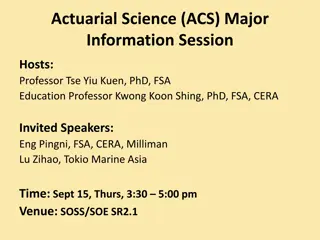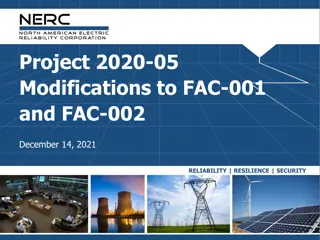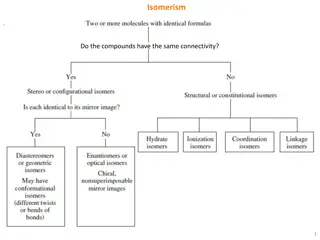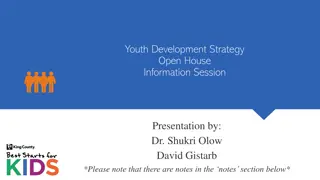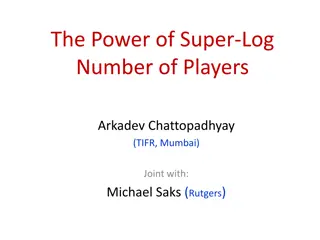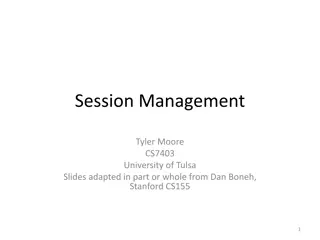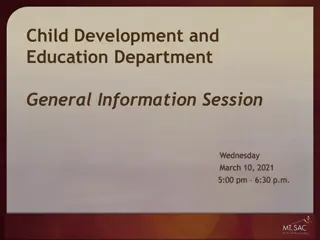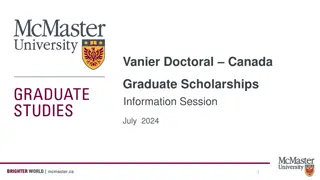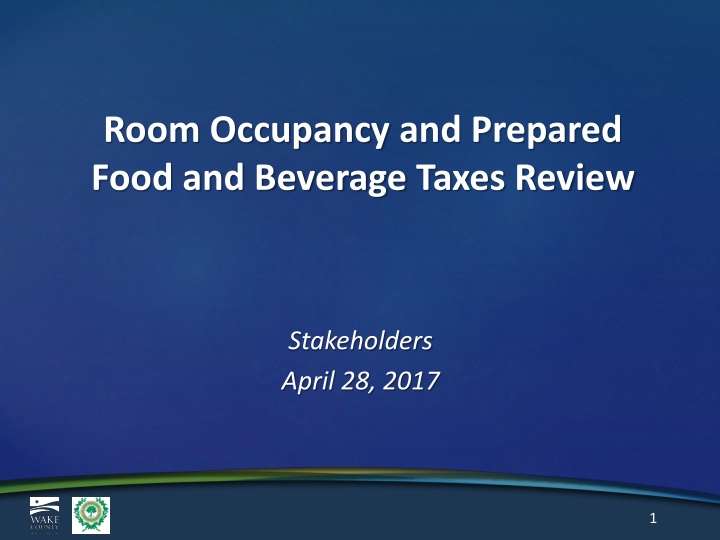
Room Occupancy and Prepared Food and Beverage Taxes Stakeholders Review
Dive into the review of room occupancy and prepared food and beverage taxes, examining legislative empowerment, revenue distributions, stakeholder engagement, and future planning strategies.
Download Presentation

Please find below an Image/Link to download the presentation.
The content on the website is provided AS IS for your information and personal use only. It may not be sold, licensed, or shared on other websites without obtaining consent from the author. If you encounter any issues during the download, it is possible that the publisher has removed the file from their server.
You are allowed to download the files provided on this website for personal or commercial use, subject to the condition that they are used lawfully. All files are the property of their respective owners.
The content on the website is provided AS IS for your information and personal use only. It may not be sold, licensed, or shared on other websites without obtaining consent from the author.
E N D
Presentation Transcript
Room Occupancy and Prepared Food and Beverage Taxes Review Stakeholders April 28, 2017 1
Welcome and Why Are We Here Wake County levies county-wide room occupancy and prepared food and beverage taxes Enabling legislation empowers City of Raleigh and Wake County to distribute the two tax revenues Legislation directs certain distributions and provides flexibility for others Every few years, City and County work with partners to review financial models and make decisions regarding revenues and community needs/desires In 2016, conducted a review (Phase I) that resulted in 20th Amendment to the governing agreements Made certain structural changes providing a good starting point for a broader Phase II review to focus on longer-term options and strategies Additional structural changes may be reviewed in response to future needs
Phase II Review Engage broad group of stakeholders Provide education on: History and legislation Performance and trends of revenues Distribution of funds Current status of financial models Develop principles to guide future decisions Consider capacity and demand Review strategies and timelines for future actions
Todays Meeting Agenda: Review Operating Principles edited at last stakeholder meeting Review Operating Practices to clarify administrative oversight of revenues Discuss next steps 1. 2. 3.
Materials Agenda Presentation Operating Principles Operating Practices Summary
Background Authorizing legislation approved in 1991; amended in 1995 Tax levies 6% on occupancy stays; 1% on prepared food and beverage Revenues in 1995 = $12.4 million Revenues in 2016 = $48.6 million Revenues must be used for projects supporting arts, cultural, sports or convention Original Interlocal Agreement between City of Raleigh and Wake County in 1991; Revised in 1995 There have been 20 Amendments to the Revised Interlocal Agreement 6
Why Did We Develop Operating Principles? Two organizations make decisions regarding funding for many interested parties Principles will help articulate values of stakeholders/ community Use principles to guide future decisions in keeping with values of stakeholders/ community
Operating Principles Prioritize use of funds for projects that drive measurable, regular overnight visitation or positive return on investment (ROI) Support and promote the on-going capital expenditure program and expansion of existing investments in major facilities to keep them current, relevant and competitive in market Comply with all requirements of the existing enabling legislation Ensure project investments are secured by solid long-term plans, both operational and financial, that demonstrate viability and sustainability Utilize high standards of fiscal accountability in planning and managing the use of tax revenues: Fulfill existing obligations before entering into significant new financial commitments Maintain long-term, conservative financial forecasting A. B. C. D. E. a. b. Not in priority order.
Operating Principles, Contd Support investments that complement economic development efforts and enhance quality of life experiences for visitors, newcomers and long-time residents Create sports, arts and cultural opportunities, through leveraging community investments and partnerships, that benefit residents and enhance tourism offerings Support a project investment mix that considers location and types of uses (sports, cultural, arts, convention, etc.) Engage stakeholders representing varying entities, jurisdictions and uses Ensure that investments support the long-term vision of Wake County and its cities and towns as a tourism destination Provide a regular funding source for eligible projects that require a smaller scale investment Support investments that consider emerging arts, sports and cultural experiences and unmet needs F. G. H. I. J. K. L. Not in priority order.
Ranking of Principles The March 9, 2017 stakeholders meeting identified 12 Guiding Principles for Use of Room Occupancy and Food and Beverage Taxes Attendees were asked to rank the 12 Principles based on the importance of the Principle to them 1 for Principle most important to you 12 for Principle least important to you Attendees were asked to select a constituency group they represented for purposes of ranking The results of the exercise are included in Table 1 and Table 2 below.
Table 1 Notes: Lists all 12 Principles in the order presented to the stakeholders (A through L.) Each individual set of rankings was assigned to the self- identified constituency group. An average score was developed for each constituency group based on the number of respondents per group. A total of 47 responses were tallied and categorized into nine constituency groups. The Arts/Culture and GRCVB/Hospitality groups were combined for scoring purposes.
Results of Ranking by Attendee Category Table 1: *highlighted cells represent avg scores of lower than 6
Table 1 Summary: Findings: 11 of the 12 Principles received overall high rankings (top half) by at least one constituency group No Principle received a high ranking by all constituency groups Many Principles averaged mid-range scores indicating moderate levels of importance or varying levels of importance that moderated the average. Takeaways: Establishing Practices that consider all Principles is important to best reflect the varying perspectives of the constituency groups and needs of the community Funding decisions will likely have impacts that delight or disappoint various constituency groups
Table 2 Notes: Lists all 12 Principles in the order of the Total Average The Total Average was calculated by adding the average scores of each constituency group and dividing by the total number of groups (9).
Results of Ranking Total Avg Table 2: Total Avg Prioritize use of funds for projects that drive measurable, regular overnight visitation or positive return on investment (ROI) Support and promote the on-going capital expenditure program and expansion of existing investments in major facilities to keep them current, relevant and competitive in market A Comply with all requirements of the existing enabling legislation Ensure project investments are secured by solid long-term plans, both operational and financial, that demonstrate viability and sustainability Utilize high standards of fiscal accountability in planning and managing the use of tax revenues: - Fulfill existing obligations before entering into significant new financial commitments - Maintain long-term, conservative financial forecasting Support investments that complement economic development efforts and enhance quality of life experiences for visitors, newcomers and long-time residents Create sports, arts and cultural opportunities, through leveraging community investments and partnerships, that benefit residents and enhance tourism offerings Support a project investment mix that considers location and types of uses (sports, cultural, arts, convention, etc.) K Engage stakeholders representing varying entities, jurisdictions and uses Ensure that investments support the long-term vision of Wake County and its cities and towns as a tourism destination F Provide a regular funding source for eligible projects that require a smaller scale investment L Support investments that consider emerging arts, sports and cultural experiences and unmet needs C 4.3 B 4.4 4.5 E 5.4 D 6.0 I 6.4 G 6.5 H 6.8 7.0 J 7.5 7.6 9.9 *Total Avg = Sum of average score for each category divided by nine.
Table 2 Summary: Findings: The three top scored Principles received average scores within 1/10th of each other The range of average scores was just 5.6 points between most important and least important Takeaways: Average scores affirm importance of all Principles Top ranking Principles highlight importance of maximizing return on investment, ensuring ongoing competitiveness of major investments and affirm enabling legislation
Since our Last Meeting Staff Work Team met to develop Practices and next steps Staff Work Team includes representatives from: Centennial Authority City of Raleigh Greater Raleigh Convention & Visitors Bureau Hospitality Alliance Town of Cary Town of Morrisville Wake County Facilitator: George Alwon
Draft Practices Purpose: Articulate procedures and standards used in administering the two taxes. Approached development of the practices as if the reader was a new town manager with little to no history of the revenues. Executive oversight provided by Wake County and City of Raleigh managers. Reflect decisions through the 20th Amendment. Practices categorized into two key areas: General Operating Practices Financial Model/Plans Practices
Draft Practices See Draft Document (Version 1.3)
Table Discussion of Practices 1. Select table leader/timekeeper 2. Discuss questions: Do draft Operating Practices clarify operating procedures for you? What is missing or unclear in the Draft Practices? 3. Develop consensus at table if wordsmithing, new language or additional practices are needed Capture any changes and turn in 4. Each table has a member of the staff work team The Work Team will review feedback and revise Practices after Stakeholder meeting.
Destination Strategic Plan Led by Greater Raleigh Convention and Visitors Bureau Goal increase visitors and convention business from 15.1 visitors in 2015 go 19.5 million visitors in 2028 Three key objectives: Build consensus among stakeholders on trends impacting destination marketing industry and opportunities and threats to our community Identify and assess gaps in tourism infrastructure Recommend actions and activities for community
Destination Strategic Plan Engaging consultant: Interview key stakeholders, influencers Interview key organization leaders, staff members and partners Lead focus group discussions Lead strategic discussions with various groups Conduct best practice and benchmark research
Destination Strategic Plan Timeline: Approved by GRCVB Board April 2017 Engage consultant June 2017 Conduct study 12/13 months Receive final report late summer 2018
Town of Cary Facilities Planning Town of Cary submitted request during Phase I for consideration of needs of sports facilities to remain competitive and attract events. Recommending that Town of Cary conduct comprehensive Capital Improvement Plan for sport facilities (WakeMed Soccer Complex, USA Baseball Complex and Cary Tennis Complex) Cost = Not to exceed $125,000 Funding proposed to be provided with FY2017 Small Projects Fund Complete in 2018
Small Projects Funding Process Wake County to begin process this fall Request Board approve process Summer 2017 Release RFP Oct/Nov 2017 Receive Proposals Jan/Feb 2018 Award Projects Mar/Apr 2018 Maximum per project of $1.5M ~$3.5M available for FY2017 and FY2018 Anticipate two-year cycle
Small Projects Funding Capacity Current Funding Capacity FY 2017 FY 2018 $323,680 FY 2019 FY 2020 Committed: Capital Athletic Pavilion Recommended Commitment: Town of Cary Uncommitted Allocation Uncommitted Cumulative Total $125,000 $1,551,320 $2,000,000 $2,000,000 $2,000,000 $1,551,320 $3,551,320 $5,551,320 $7,551,320 *On November 7, 2016, the Board committed a total of $350,000 to the Capital Athletic Pavilion as part of the 2-for-1 Competitive Process. $26,320 was available through 2 for 1 funds with the remaining $323,680 to be funded through the Small Projects Fund.
Next Steps: Conclude Phase II Review Provide update to Board of Commissioners and Raleigh City Council May 2017 Complete Destination Strategic Plan Complete Town of Cary Sports Facilities Comprehensive Capital Improvement Plans Continue work of Centennial Authority and City of Raleigh related to long term facility planning Engage Staff Work Team to monitor revenue growth and develop financial modeling scenarios for addressing future needs Complete webpage Complete next stakeholder review by January 1, 2020
Questions? 30


